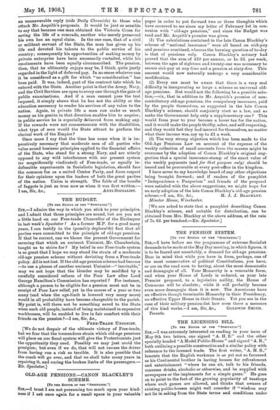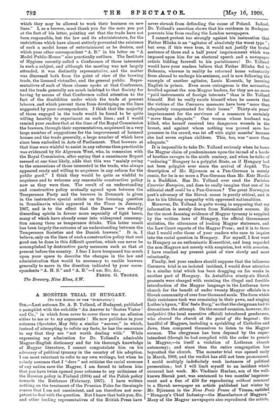THE LICENSING BILL.
LTO TEE EDITOR OP THE "SPECTATOR."] SIR,—I was extremely interested on reading in your issue of May 9th two letters, one signed "A. H. S." and the other specially headed "A Model Public-House " and signed "A. B.," both outlining a possible constructive and a similar policy with reference to the licensed trade. The first writer, " A. H. S.," laments that the English workman is as yet not so favoured as his Continental brother in having houses for refreshment and entertainment " where he can sit, talk to his friends, consume drinks, alcoholic or otherwise, and be supplied with newspapers or the implements for a simple game." He goes on to point to the fact of the growing popularity of teashops where such games are allowed, and thinks that owners of existing public-houses might well consider if " wisdom may not lie in asking from the State terms and conditions under which they may be allowed to work their business on new lines." I, as a brewer, must thank you for the note you put at the foot of his letter, pointing out that the trade have not been responsible, but the law and its administrators, for the restrictions which have almost entirely prevented the existence of such a model house of entertainment as he desires, and which your other correspondent "A. B." in his letter on "A Model Public-House" also practically outlines. The Institute of Hygiene recently called a Conference of those interested in such a subject, and although the meeting was not largely attended, it was distinctly representative, and the matter was discussed both from the point of view of the brewing trade, the licensed victualler, and the general public. Repre- sentatives of each of these classes spoke at that Conference, and the trade generally are much indebted to that Society for having by means of that Conference called attention to the fact of the disabilities under which the trade at present labours, and which prevent them from developing on the lines suggested by your correspondents. I think that the majority of those engaged in the trade would be found to be quite willing heartily to experiment on such lines ; and I would remind your readers that at the time of the Royal Commission the brewers, through their representatives, acquiesced in a, very large number of suggestions for the improvement of licensed houses and the trade generally, a large number of which have since been embodied in Acts of Parliament. That brewers at that time were wishful to assist in any reforms then practicable was evidenced by Sir Algernon West, who, in connexion with the Royal Commission, after saying that a unanimous Report seemed at one time likely, adds that this was " mainly owing to the concessions of those interested in the trade, who always appeared ready and willing to acquiesce in any reform for the public good." I think they would be quite as wishful to acquiesce and to welcome any reasonable constructive policy now as they were then. The result of an understanding and constructive policy mutually agreed upon between the Temperance Party and the brewers in Denmark is given in the instructive special article on the licensing question in Scandinavia which appeared in the Times in January, 1907, and is to the effect that the Danes "are steadily discarding spirits in favour more especially of light beers, many of which have already come into widespread consump- tion among them as temperance drinks. This latter result has been largely the outcome of an understanding between the Temperance Societies and the Danish brewers." It is, I believe, only on the lines of such a constructive policy that real good can be done in this difficult question, which can never be accomplished by destructive party measures such as that at present before the country. I fear I have trespassed too much upon your space to describe the changes in the law and administration that would be necessary to enable brewers generally to move in the direction indicated by your corre- spondents "A. H. S." and "A. B."—I am, Sir, &c.,















































 Previous page
Previous page